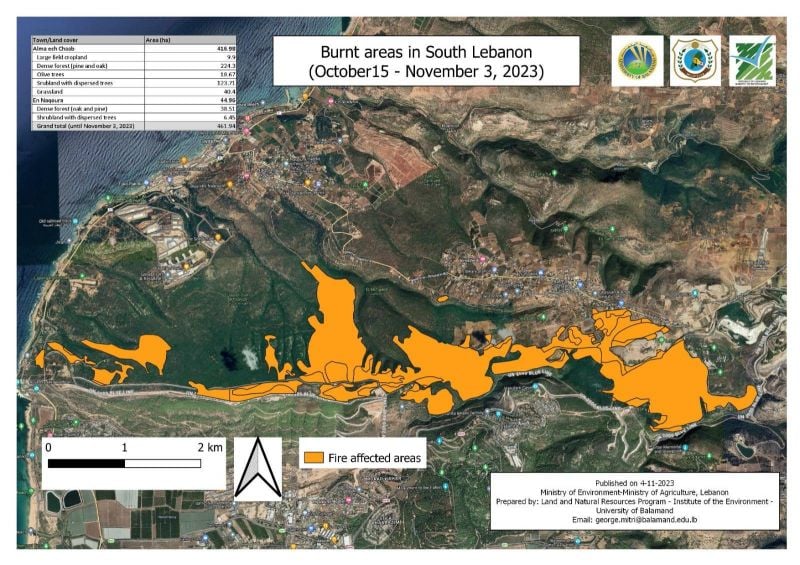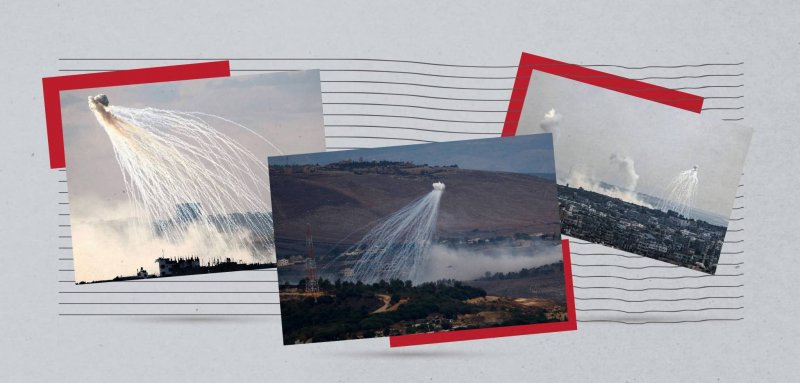After more than 250 days of war on Gaza, the crimes committed by the Israeli army in Gaza and southern Lebanon can be described as systematic, aimed at causing maximum possible damage. These crimes are not only crimes against humanity but also environmental crimes, the most dangerous of which is the use of internationally banned weapons, including white phosphorus bombs. Israel has long used these bombs in its wars on Lebanon and Gaza, and are employing them today as well in its scorched earth policy. What is white phosphorus, and how does it affect the agricultural lands in the south of Lebanon?
After more than 250 days of war on Gaza, the crimes against humanity committed by Israel in Gaza and southern Lebanon can be described as systematic, aimed at causing maximum possible damage. Israel has long used internationally banned weapons including white phosphorus bombs in its wars on Lebanon and Gaza, and are employing them today as well in its scorched earth policy
The impact on the environmental and agricultural reality
Dr. Hisham Younes, head of the Green Southerners association, states that it is difficult to obtain accurate figures describing the environmental catastrophe in the South due to the severity of the dangerous situation there. However, "we can rely on the latest figures published by the Ministry of Agriculture, which announced that the total area burned by white phosphorus or incendiary bombs amounts to about 2,400 dunams, or 2 square kilometers. Forty percent of this burned area is agricultural land, and 60% constitute forest and gum trees."
According to these figures, white phosphorus has burned more than 60,000 olive trees, most of which are productive, long-lived trees. Israeli airstrikes have also caused over 657 fires, damaging more than 6,000 dunams (6 square kilometers) of forests and agricultural lands.
It is difficult to obtain accurate figures describing the environmental catastrophe in southern Lebanon due to the severity of the dangerous situation there. However, Israel has burned at least 2,400 dunams using white phosphorus or incendiary bombs. The burned area includes more than 60,000 olive trees, most of which are productive, long-lived trees, according to the Lebanese Ministry of Agriculture
What is white phosphorus?
According to the World Health Organization, “White (sometimes called yellow) phosphorus is a white to yellow waxy solid with a garlic like odour”. White phosphorus ignites spontaneously in air at high temperatures and “continues to burn until it is fully oxidized”, producing “dense, white, irritating smoke containing mixed phosphorus oxides. White phosphorus is used for military purposes in grenades and artillery shells to produce illumination, to generate a smokescreen and as an incendiary.”
How does it affect health?
Exposure to white phosphorus can “cause deep and severe burns, penetrating even through bone”, and are extremely painful and result from a combination of thermal and chemical injuries. White phosphorus is highly soluble in fats, allowing it to penetrate underlying tissues, leading to deep, slow-healing burns.
What is its impact on the environment?
When targeted by white phosphorus munitions, agricultural lands suffer a decrease in productivity. Existing plants may experience adverse effects including drought and wilting. White phosphorus shelling can also cause widespread fires that spread over large areas and continue burning until the materials are completely consumed. The use of white phosphorus munitions leaves 10% of the phosphorus in the soil or water, making soil recovery from this toxic substance a challenging process that can take years.
 Source: L'Orient-Le Jour – A map showing the extent of the fires in southern Lebanon between October 15 and November 3, 2023. The yellow areas are those affected by the fires.
Source: L'Orient-Le Jour – A map showing the extent of the fires in southern Lebanon between October 15 and November 3, 2023. The yellow areas are those affected by the fires.
Source: L'Orient-Le Jour – A map showing the extent of the fires in southern Lebanon between October 15 and November 3, 2023. The yellow areas are those affected by the fires.
The current situation is described as “ecocide”, or environmental genocide, by the head of the Green Southerners association. The fire will affect the current agricultural season and future production seasons because phosphorus burns at temperatures up to 800 degrees Celsius, causing fires and contaminating the soil, which takes many years to recover.
The targeting of agricultural lands in South Lebanon, a fertile area whose residents rely on seasonal farming as a primary source of income, is a systematic effort to cripple life along the Lebanese border with Israel. Southern agricultural seasons constitute 22% of Lebanon's total fruit and citrus production, about 38% of the total olive harvest, 5,000 tons of the 25,000 tons of olive oil produced annually in Lebanon, in addition to tobacco cultivation, which, along with other seasonal crops, generates vital income for local communities in the South, especially in border villages.
Approximately fifty southern border villages, with a majority of 70% of their population, rely on agriculture as their main source of income. These farmers, who have been cut off from their lands for about 8 months, have not yet been able to assess the damage and are currently displaced without any alternative source of livelihood. Many were unable to harvest the olive season last fall (during the start of the war in October 2023) and may not be able to harvest the coming fall season due to the ongoing uncertainty surrounding military and political events. Additionally, farmers lack information about the condition of their lands and have not been able to plow them to prepare for the next season. Similarly, the state and its ministries have not been able to assess the damages and have not announced any clear plans to compensate the farmers.
The targeting of agricultural lands in South Lebanon, a fertile area whose residents rely on seasonal farming as a primary source of income, is a systematic effort to cripple life along the Lebanese border with Israel. Southern agricultural seasons constitute 22% of Lebanon's total fruit and citrus production, about 38% of the total olive harvest, 5,000 tons of the 25,000 tons of olive oil produced annually in Lebanon
Zein Sarhan, the owner of an olive oil press in the southern town of Kfarkela, told Raseef22 that the 2022 olive season, before the war, was excellent, and has greatly benefited the residents of the town and neighboring areas that rely on his press. However, in 2023, with the onset of the war, only a few residents managed to harvest their crops, as many presses, especially small and manual ones, closed their doors in fear of being targeted by the Israeli military.
Sarhan explains that many olive growers in the area had to leave their harvest behind to escape the war, and have so far not been able to access their lands to harvest the 2024 season. Now, more than eight months after operation Al-Aqsa Storm, residents are aware that their lands might have been affected by white phosphorus, but they do not know the extent of the damage and have not been able to visit or cultivate their fields, amidst a complete absence of state support, according to Sarhan.
History of attacks on Lebanon
Israeli forces have used white phosphorus directed at populated and agricultural areas throughout their wars on Lebanon since 1978. According to Amnesty International, “The use of white phosphorus is prohibited under international humanitarian law. Despite its legitimate uses, it should never be aimed at residential areas and civilian infrastructure or areas close to them because the resulting fires and smoke can spread. Such attacks, which do not distinguish between civilians and military objectives, are indiscriminate and thus prohibited.The usage of white phosphorus is restricted under international humanitarian law. Although there can be lawful uses, it must never be fired at, or in close proximity to, a populated civilian area or civilian infrastructure, due to the high likelihood that the fires and smoke it causes spread. Such attacks, which fail to distinguish between civilians and civilian objects and fighters and military objectives, are indiscriminate and thus prohibited.”
Israel used white phosphorus bombs and cluster bombs 17 years ago during the July 2006 war on southern Lebanon, damaging the land while also leaving mines and cluster bombs behind. Although the state has formally approved compensation for farmers whose lands were damaged, many have yet to receive these payments from the High Relief Committee.
Today, amidst the severe economic crisis that Lebanon has been suffering from since 2019, compensation seems a distant hope. Farmers, press owners, vegetable traders, and others fear they will bear the losses alone.
Brief timeline of the history of IDF attacks against Lebanese citizens
Source: The Socio-Environmental Impact Of White Phosphorus Ammunition In South Lebanon – Nature Conservation Center, AUB | “Our research identified at least five instances when the IDF employed WP munitions against Lebanese citizens. Over time, these attacks resulted in significant damage to human life, property, and the natural environment. The numbers below portray the total damage caused by these attacks, as it is not possible to isolate the specific impact of WP munitions.”
Dr. Hisham Younes, head of the Green Southerners association, expresses that "Olive trees here are targeted, as in the West Bank and Gaza, because they are a source of life and represent a connection to the land, a form of attachment to it. This is an attempt to break the deep bond between southerners and their land. The use of white phosphorus is an attempt to make these areas unlivable, uninhabited, and exposed militarily."
This became evident when the Israeli army targeted and burned forests, impacting soil and air quality in the region and its interconnected environment and ecosystem, thus affecting the local communities' ability to remain. This is part of Israel's scorched earth policy, which amounts to "ecocide", directly impacting local communities by targeting air quality, soil, and groundwater, especially during environmental challenges such as water scarcity and climate changes.
The Israeli army targeted and burned forests, impacting soil and air quality in the region and its interconnected environment and ecosystem, thus affecting the local communities' ability to remain. This is part of Israel's scorched earth policy, which amounts to "ecocide", directly impacting local communities by targeting air quality, soil, and groundwater
Therefore, the insistence of landowners in the West Bank, Gaza, and southern Lebanon on remaining on their land and replanting it even after it has been burned is a direct and clear expression of attachment to the land.
It is worth noting that the source of phosphorus bombs is the military aid the United States regularly sends to Israel, according to an investigation by The Washington Post. The United States is by far the largest supplier of weapons to Israel, having helped build one of the most technologically advanced armies in the world.
Raseef22 is a not for profit entity. Our focus is on quality journalism. Every contribution to the NasRaseef membership goes directly towards journalism production. We stand independent, not accepting corporate sponsorships, sponsored content or political funding.
Support our mission to keep Raseef22 available to all readers by clicking here!
Interested in writing with us? Check our pitch process here!





